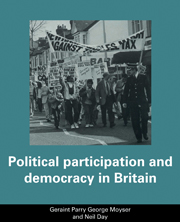Book contents
- Frontmatter
- Contents
- List of figures
- List of charts and maps
- List of tables
- Preface
- Part I Theories and methods
- Part II Patterns and pathways
- Part III Issues and actions
- Part IV The local process
- Part V Conclusions
- 19 Participation and democracy in Britain
- Appendix A Survey methods
- Appendix B Measuring elite-citizen concurrence
- Appendix C The National Questionnaire
- Endnotes
- Bibliography
- Index
19 - Participation and democracy in Britain
Published online by Cambridge University Press: 03 May 2011
- Frontmatter
- Contents
- List of figures
- List of charts and maps
- List of tables
- Preface
- Part I Theories and methods
- Part II Patterns and pathways
- Part III Issues and actions
- Part IV The local process
- Part V Conclusions
- 19 Participation and democracy in Britain
- Appendix A Survey methods
- Appendix B Measuring elite-citizen concurrence
- Appendix C The National Questionnaire
- Endnotes
- Bibliography
- Index
Summary
Our first objective in this book was to draw the map of political participation in Britain. This map was intended to display the two fundamental dimensions of participation relevant to democracy. The first dimension would show the extent of citizen activity. The second dimension would show the social profile of participation – who participates. Following from these twin concerns, it would then be possible to try to trace the impact of participation.
The interest in citizen participation was prompted by a normative concern with the condition of modern democratic processes in general and with those in Britain in particular, since they have long been regarded as exemplars of one of the major types of liberal democracy. Chapter 1 drew attention to the centrality of the idea of participation to current debates about the nature of democracy and about its future. In chapter 2 it was shown that participation had also appeared, from time to time, as part of the rhetoric of British politics. However, despite contending views as to the value of participation, information about the actual level of citizen activity and about its impact in Britain was hitherto limited and scattered. Without such knowledge, the normative debate about the desirability and potential of enhanced citizen involvement in modern democratic politics, whilst not meaningless, lacks empirical grounding. The study of what ‘is’ the case and what ‘ought’ to be the case may be logically distinct.
- Type
- Chapter
- Information
- Political Participation and Democracy in Britain , pp. 415 - 433Publisher: Cambridge University PressPrint publication year: 1992



